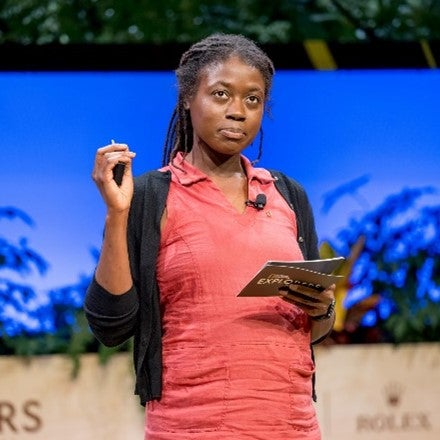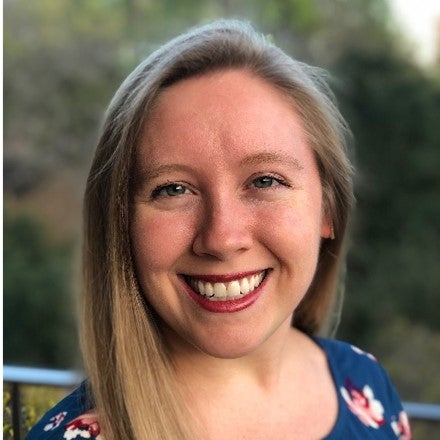2024-2025
Lydia Gibson
Department of Anthropology, College of Arts and Sciences

Lydia Gibson is a geographer, environmental anthropologist, and Assistant Professor of Race and Technology at Georgetown University. Lydia’s research spans across natural and social sciences to understand how social, political, and ecological change, colonial histories, and the materialisation of environmental discourses and actions come to shape the rituals, livelihoods, and bicultural experiences of traditional forest communities in the Caribbean. Lydia’s research also explores how environmental data practices – e.g. GIS, remote sensing data, and ecological methods – shape and differentiate access and power in environmental spaces. Lydia holds a bachelors degree in Mathematics and Biology from University of Bristol, and two Masters (in Sociology and Anthropology) and a PhD in environmental anthropology from UCL (University College London). Lydia remained at UCL for a postdoc, under the ESRC fellowship she was awarded by the UKRI, before moving to Columbia University for another postdoctoral position. Lydia is particularly interested in the intersection of physics and social theory and works closely with traditional communities to monitor ecosystems and document and resist the exploitation, misuse, and colonisation of traditional and indigenous knowledge.
Jane Komori
School of Foreign Service (SFS)

Jane Komori is Provost’s Distinguished Faculty Fellow and Assistant Professor of Labor, Migration, and Racial Capitalism in the Walsh School of Foreign Service. She holds a PhD in the History of Consciousness, with emphases in Critical Race and Ethnic Studies and Feminist Studies, from the University of California Santa Cruz. Prior to coming to Georgetown, she was a Postdoctoral Research Fellow in the Department of History at the University of British Columbia.
Jane’s research focuses on race, labor, and ecology. Her current book project investigates the labor history and self-organization of Asian immigrant and Indigenous workers in Western Canada’s primary resource industries from the 1850s to the mid-twentieth century. The book theorizes the way that racial forms, specifically the racialization of labor, are produced at the intersection of settler colonialism, resource extraction, and resultant environmental change.
Jane’s writing has appeared or is forthcoming in Radical History Review, Historical Materialism: Research in Critical Marxist Theory, Crime, Media, Culture: An International Journal, Critical Ethnic Studies, Asia-Pacific Journal,and Qui Parle: Critical Humanities and Social Sciences,as well as a number of public-facing venues, including Viewpoint Magazine, The Globe and Mail, Ricepaper Magazine, Matrix Magazine, GUTS Canadian Feminist Magazine,and The Bulletin/Geppo.
Kaylee Matheny
McCourt School of Public Policy

Kaylee Matheny is an assistant professor at Georgetown University’s McCourt School of Public Policy. She uses quantitative descriptive, quasi-experimental, and qualitative methods to examine socioeconomic inequality, and her work has been published in outlets such as American Sociological Review, American Educational Research Journal, and Educational Evaluation and Policy Analysis. She conducts three strands of work: evaluating equitable policies and practices, understanding people’s educational experiences as classed, and analyzing how socioeconomic status intersections with other social identities. Her work is driven by her own experiences as a low-income, first-gen high school graduate, as well as the experiences of her family, the 10th graders she taught, and her former schoolmates in her hometown of Griffin, GA.
Matheny holds a BA in Sociology and English-Creative Writing from Emory University, a MA in Sociology from Stanford University, and a PhD in Education Policy and Sociology of Education from Stanford University. Prior to graduate school, Matheny was a 10th grade English teacher and content lead at her high school alma mater. She loves collecting books (and occasionally reading them), playing board games, bingeing comedy series, and making new recipes.
Kelsey Moore
Department of Black Studies and History, College of Arts and Sciences

Kelsey Alejandra Moore is a Provost’s Distinguished Faculty Fellow and Assistant Professor of African American History and Black Studies. Her work focuses on rural black southern histories, raising questions about race, religion, and culture in the 20th century. Her current book, What the Dead Witnessed, interrogates how rural development in South Carolina’s Santee-Cooper basin inflicted spiritual, ecological, and epistemic violence against black and indigenous peoples. Through a close examination of the Santee-Cooper Hydroelectric and Navigation Project, What the Dead Witnessed demonstrates how the ritualistic nature of modernization collapsed various notions of time, space, and place.
As an inaugural 2022-2023 Crossroads Research Fellow based at Princeton University, Moore created “We Just Don’t Trust Our Memories to Stone ,” a digital project that remaps cemeteries flooded by the Santee-Cooper Hydroelectric and Navigation Project. In doing so, the digital project remembers various Conjure knowledge(s) necessary to the lives and deaths of black South Carolinians.
Before coming to Georgetown, Moore received her M.A. and Ph.D. in History from Johns Hopkins University. She received a Dual B.A. in Africana Studies and Public Policy at New York University, where she graduated summa cum laude as the 2019 Valedictorian of the College and Arts and Science.
When she is not researching, Moore enjoys spending time with her two cats, Liberation and Abolition and baking vegan chocolate chip cookies.
Emma Smith
School of Foreign Service

Emma Smith (she/her) is a development economist with a focus on refugees, migration, and social norms. One main strand of Emma’s research aims to understand how refugees make economic decisions and what interventions can meet the pressing needs of forcibly displaced people. Emma often works in collaboration with humanitarian organizations, and her research has looked at barriers to mental health care-seeking, effectiveness of shelter interventions, and access to remote work opportunities. In a second strand of research, Emma focuses on the effects of social norms broadly, with work on mental health stigma and gender norms. Emma holds a PhD in Public Policy from Harvard University and a bachelor’s in both Economics and Middle Eastern Studies from Wellesley College. Emma was born and raised on the island of St. Croix in the US Virgin Islands. In her free time she loves to backpack, cook, eat, garden, and climb.
